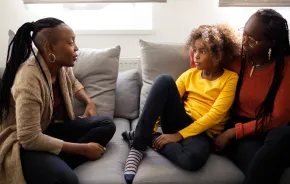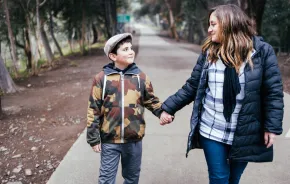
I can remember being 12 more clearly than I would sometimes like to. That was the year I emerged from the cocoon of childhood into the bright social light of adolescence. Suddenly, I cared what people thought about me — how I looked, what I said, what I music I listened to and how I combed my hair. I wanted to live my own life, but I also very much wanted to fit in — or, at the very least, not be seen as some kind of oddball.
That was also the same year I noticed what an oddball my father was in social situations. He seemed to interview strangers if we were waiting in line, or ask inappropriately intimate questions of waitresses. He just never seemed comfortable in banks or grocery stores or restaurants. I often found myself thinking, “God, Dad. Please, just be normal.”
It turns out my father falls within the autism spectrum, specifically the Asperger’s end of that spectrum. There were many challenges that came with being his son, but I have come to understand that there were far more benefits to me in the long run, benefits I found while raising my own son on the spectrum, but also in learning how to better relate to all people with or without what we call special needs.
Everyone in the family should work hard. What’s hard for one might not be hard for another. That’s okay.
If you’re a parent of both a child with special needs and a typically developing child, I’m confident that the typically developing child is only going to turn out more compassionate and empathetic because they have a sibling with special needs. The problem is that you probably can’t tell your child that — especially when they’re an adolescent.
“When I was a kid,” said Julie Osterling, “I just withdrew while my parents were busy helping my sibling with special needs.”
Osterling went on to become a clinical psychologist, and now finds herself helping families navigate this unusual dynamic. “Typically, the sibling either withdraws, like I did, or tries to become a co-parent. Neither is ideal,” Osterling says. “As the parent, you have to set strong expectations, whether it’s that the child remains an active member of the family or by setting clear boundaries for where that child’s responsibilities end.”
Of course, what those boundaries are or what active participation looks like will vary from family to family.
“Don’t let the typically developing kid use his or her sibling as an excuse for anything,” Osterling says. “Everyone in the family should work hard. What’s hard for one might not be hard for another. That’s okay. The fair thing is that everyone works as hard as they can. No one gets a pass — whether they have special needs or not.”
Hard work has its benefits. As the director of Aspiring Youth, a program of not-for-profit agency Ryther that offers assistance to young adults on the autism spectrum, Ben Wahl has a lot of experience with both children with special needs and their siblings.
“A parent once told me that their special needs kid is like ‘the best gift in the world, but with really difficult wrapping paper.’” Which perhaps explains why some of Wahl’s best counselors and facilitators have siblings with special needs. “The sibling has a tremendous opportunity to develop empathy, justice and appreciation of other communities,” he says.
When thinking of empathy, Wahl offers this definition: seeing the positive that is often missed. It’s critical, he says, that everyone in the family understands that the goal is actually not to be “normal,” whatever that is. The goal is to work as hard as we can to be our authentic selves.
Personally, I’ve never met anyone who doesn’t need to learn this lesson. Who doesn’t want to be appreciated for what lies beneath our surface?
When I was 12, I didn’t actually care that much about my hair or clothes or whether I was cool or not; I just worried that somehow these things defined my value and that I had to get them right to be acceptable. I had set myself to an impossible task.
Meanwhile, even as I cringed at my father’s social awkwardness, even as I prayed that somehow this time he’d just be normal, I also saw someone I loved working as hard as he could to connect with other people. I hoped those other people saw what I could see: that he was a good guy, that he was kind and that he wanted to have an interesting conversation. I’ll never know what they saw, but I do know that even as a 12-year-old, I had already begun to learn how to look beyond the surface for a person’s value.











